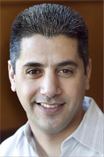Date: Tuesday, January 29, 2019 at 1:00 pm EST
Free to attend
Length: Approximately one hour
In semiconductor manufacturing, traditional root cause analysis using FDC summary data is not always effective in solving complex issues, especially when the defect signals are too subtle to detect. Full trace analytics enables the discovery of these hidden signals. This allows fab engineers to accurately pinpoint the root causes of yield-impacting issues. This webcast will discuss several use cases to showcase how advanced full trace analytics can help not only in provide accurate results, but can also simplify the root cause analysis process and reducing time-to-root-cause, resulting in better yields, lower production costs and increased engineering productivity.
In this LIVE webcast, BISTel’s Chief Product Management Officer, Gabe Villareal will discuss how BISTel is leading the industry with its new full trace analytics to simply root cause analysis, which enables fab engineers to pinpoint the issues than impact yield and productivity quicker than ever. Full trace analytics enables the comprehensive examination of process trace data to allow the detection of abnormalities and deviations to the finest details.
What You’ll Learn:
- Learn how to improve yield and reduce risk with new full trace analytics to simply root cause analysis.
- Hear why traditional root cause analysis using FDC summary data is not always effective in solving complex issues, especially when the defect signals are too subtle to detect.
- Understand how full trace analytics enables the comprehensive examination of process trace data to allow the detection of abnormalities and deviations to the finest details.
- Learn how these techniques can help not only provide accurate results, but can simplify the root cause analysis process and reduce time-to-root-cause. This results in better yields, lower production costs and increased engineering productivity.
About the Speaker:
Gabe Villareal, Vice President, Global Product Management Group, BISTel
As Vice President Global Product Management (GPM) at BISTel, Mr. Villareal leads the company’s product development programs. He is largely responsible for bridging BISTel’s semiconductor industry leading Equipment Engineering Systems (EES) and its new adaptive intelligence (AI) applications for smart manufacturing. Together, these intelligent manufacturing solutions detect, analyze and predict answers to everyday manufacturing challenges quicker and more effectively than ever. Gabe and his team focus on helping engineers improve quality, productivity, wafer yields, and overall manufacturing effectiveness. For more than 20 years, Gabe has led engineering and product development teams to develop winning Equipment Engineering System (EES) and analytical solutions for the global semiconductor and FPD manufacturing industries. With the meteoric rise of IIoT, Big Data, Edge and Cloud Computing, Gabe and his team are being called on more than ever to support the semiconductor engineering community as they navigate in the age of AI and industry.
Sponsored by:
BISTel is a leading provider of real-time, engineering and automation solutions for the global semiconductor, and electronics industries. Its Equipment Engineering Systems (EES) and adaptive intelligence (AI) solutions for smart manufacturing are shaping the factories of the future, by connecting data driven manufacturing organizations to better detect, analyze, and predict real-time to changing manufacturing conditions. Consequently, manufacturers can realize major costs reductions, plant wide operational efficiencies, improved yields and unmatched engineering productivity. BISTel manufacturing solutions collect and manage data, monitor the health of equipment, optimize process flows, analyze large data and quickly identify root cause failures to mitigate risk for engineers and manufacturers worldwide. Founded in 2000, BISTel has more than 377 employees worldwide. The company is headquartered in South Korea, with offices in California, China, Singapore and Texas. BISTel has a deep customer following in semiconductor, FPD, and rechargeable batteries, PCB/SMT manufacturing as well as automotive, and steel manufacturing. Its core solutions include:
- Fault detection & classification solutions that include equipment recipe management, advanced process control, equipment performance analysis and more.
- Powerful data mining, root cause analysis & pattern analysis, as well as a new Chamber Matching application to offer the industry its most comprehensive set of data analytics tools on the market.
- Innovative new predictive analytics, predictive maintenance, real-time product & facility monitoring identify issues before they happen.
For more more information contact [email protected] or [email protected]









 Mohammad Ahmad, Architect
Mohammad Ahmad, Architect Dr. Jeongdong Choe, Senior Technical Fellow
Dr. Jeongdong Choe, Senior Technical Fellow Tarek Alhajj
Tarek Alhajj










